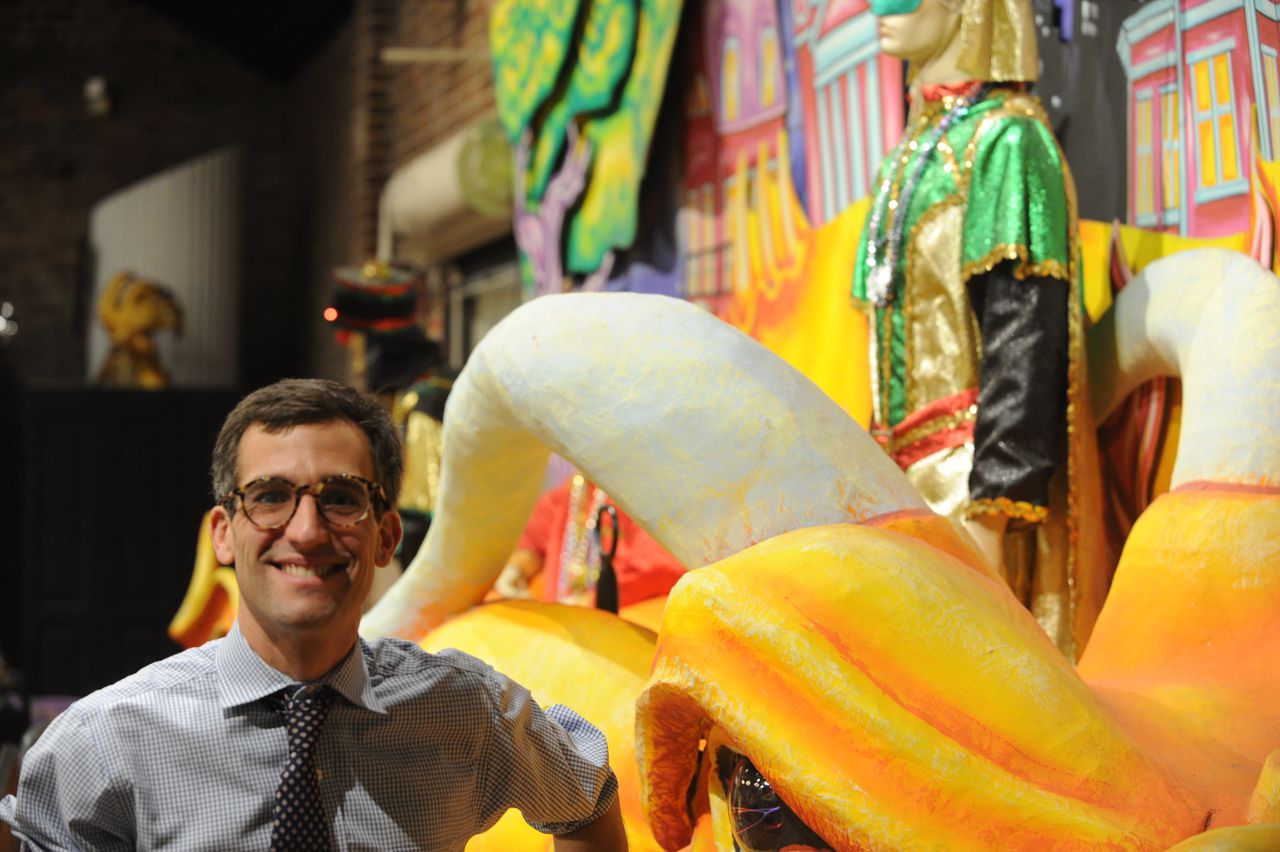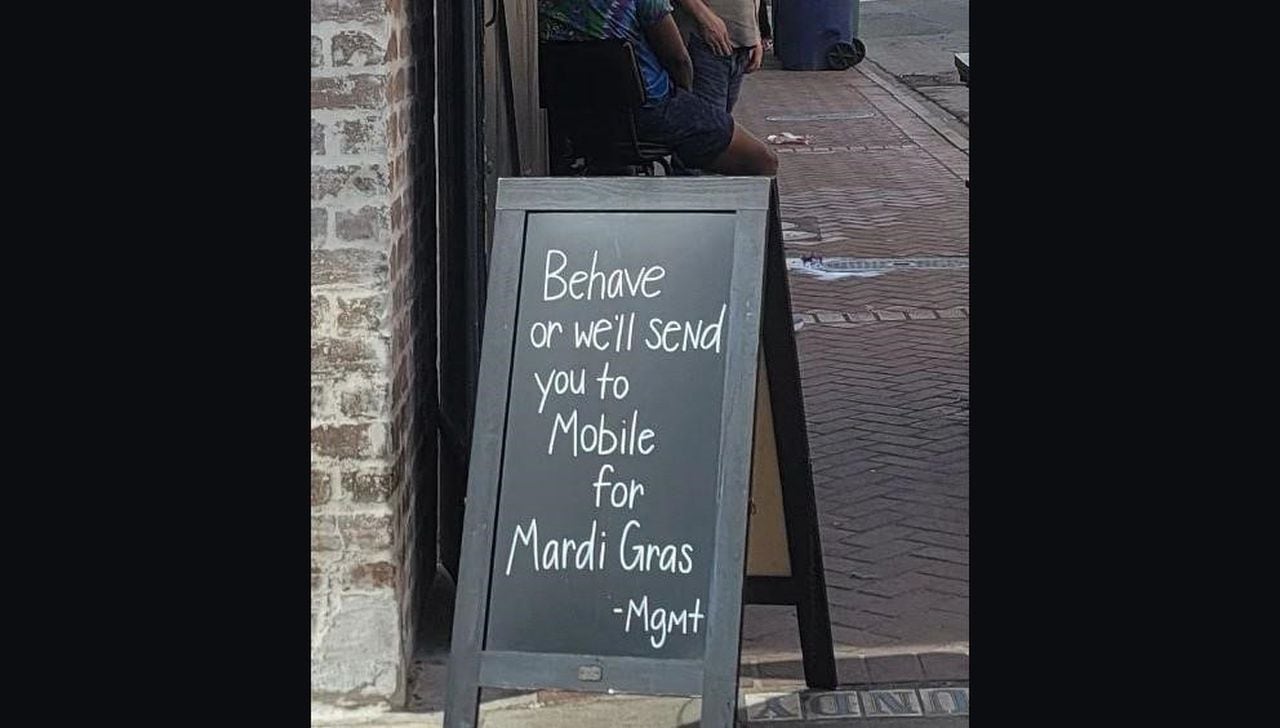Mobile or New Orleans? How Mardi Gras banter draws eyes to Alabama
“Mobile having first Mardi Gras is untrue,” screamed a headline in the January 15 edition of The Times-Picayune/New Orleans Advocate.
A few days before, Mobile Mayor Sandy Stimpson signed a proclamation granting New Orleans “permission” to celebrate Carnival this year. Mobile is “known for having the oldest Mardi Gras celebrations in the United States,” it read.
Interstate billboards, funny signs outside bars in the French Quarter, and Twitter jousting between mayors have underscored the age-old debate over an age-old question: Which city started Mardi Gras in the U.S.?
Officials call it friendly banter, but it also carries a high-stake historical footnote: To the winner comes a claim that arguably the biggest cultural celebration in the country was started in its hometown.
Mobile is planting its flag and claiming Carnival’s roots and has done it seemingly louder over the past 10 years since Stimpson first became mayor. The result, officials say, is a boost of tourism money and a reinvestment through a tourism district to generate more publicity for Mobile’s event.
“There is an old saying that ‘any publicity is good publicity’ and that may not be true, but in this case, it has worked,” said historian Wayne Dean, who has long portrayed the Mobile Mardi Gras character, Chief Slacabamarinico. “I hear from time to time about people posting to social media saying, ‘I didn’t know Mobile had Mardi Gras at all. I have to check it out.’ People are learning whether we started it or not, we got it and have had it a long, long time and that’s good.”
Claiming Mardi Gras
A billboard, erected in 2018 along Interstate 10 near Slidell, La., advertising Mobile’s Mardi Gras celebration.submitted photo
Examples in recent years, both official and quirky, include:
- Officials have long pushed Mobile as the “Birthplace of Mardi Gras,” as promoted by Visit Mobile and other local organizations. The phrase has worked: Southern Living Magazine, in a Jan. 14 article, highlighted the city as the birthplace of the modern-day Carnival celebration.
- Since 2015, Visit Mobile – the city’s convention and visitors arm – has operated under a slogan, “Born to Celebrate,” that borrows on the theme of Carnival and birth. Visit Mobile’s president & CEO David Clark said that Mardi Gras remains a key event the city tries to promote, and the formation of a Tourism Improvement District (TID) in 2019, has enabled the agency to reinvest additional lodging tax revenues toward luring publicity for Carnival.
- There is more purple and gold merchandise sold at stores throughout Mobile that illustrate a connection to Mobile’s Mardi Gras. There is also a Mobile Mardi Gras flag that debuted in 2018 and was designed to honor Mobile’s Mardi Gras, with the phrase, “Est. 1703,” which officials say is the first time a Mardi Gras celebration was held in the United States in Mobile. The flag replete with purple and gold colors only, and without the green that was introduced as part of New Orleans’ Mardi Gras in 1872.
- There are new, and growing, groups participating in this year’s Joe Cain Procession who are keeping the color battle going. Nevergreens, former during the Porch Parades of the pandemic in 2021, highlight the purple and gold colors of Mobile’s Mardi Gras, further distinguishing itself from New Orleans. The Nevergreens will hand out farce citations along the Joe Cain Procession route to anyone their masked members see wearing the color green. As a response, last year, a group called the Forevergreens were formed. Its ringleader will join this year’s procession as the “green devil,” and there are talks about offering a “pardon” to those who are ticketed along the route.
Dean, himself, said more good-natured jabbing is to come. He said there are plans for Mobile Mardi Gras boosters to travel to Point du Mardi Gras, and “reclaim” the first Mardi Gras. That spot, some 60 miles south of New Orleans along the Mississippi River, is purported to be where the first Mardi Gras-like gathering took place in 1699.
In 1999, a delegation from Rex – a famed parading krewe in New Orleans – along with other krewes based in the Big Easy, traveled to the site and to erect a commemorative plaque honoring the 300th anniversary of the first Mardi Gras celebration in Louisiana.
“But Mobile was the first capital of Louisiana before New Orleans was counted,” Dean said. “So Mobile could claim that.”
Mobile or New Orleans?

Cart Blackwell is curator at the Mobile Carnival Museum, a year-round ode to Mardi Gras in Mobile. “Mardi Gras is Mobile’s greatest living tradition.” (John Sharp/[email protected]).
Four years later, in 1703, was the year Mobile claimed the first true Mardi Gras festivity occurred on the tiny French settlement of Fort Louis de la Mobile. New Orleans wasn’t settled until 1718 – 15 years after Mobile’s first Mardi Gras celebration.
The city has long hanged its hat on the 1703 date, when a group of French soldiers held an impromptu celebration. From there, the first Carnival organizations were purportedly formed.
Cart Blackwell, curator at the Mobile Carnival Museum, said the banter of the 1700s events is less important for historians because “there is no recorded celebrations of Carnival in the 18th century for the whole of the American Gulf Coast.”
Blackwell said the “ingredients that define American Carnival celebrations were established in Mobile,” starting in 1830 with the Cowbellion de Rankin Society led by Michael Krafft. In 1843, after refusing to join the Cowbellions, the Strikers Independent Society was formed, as did the documented proof of the celebrations.
Blackwell said the mystic societies were formed in New Orleans after they started in Mobile largely by Cowbellions who defected to the Big Easy.
“If you define Carnival in this country with mystic societies and parades and the ball, happening year after year, it was established in this country in Mobile,” Blackwell said. “Modern Carnival started in Mobile. It’s a historical fact.”
Except, for this footnote: Those earliest Carnival events in Mobile revolved around New Year’s Eve.
In New Orleans, it’s something that historians like to point out.
“Alabama’s initial parades were not Mardi Gras Day, but New Year’s,” said Judy Weitz with the website MardiGrasNewOrleans.com, established in 1996, and includes contributions from historians.
She noted that the first recorded Mardi Gras parade didn’t stroll through New Orleans until 1857, with the formation of Comus.
The earliest celebrations in Mobile did not connect with Fat Tuesday until after the Civil War, when Joe Cain – dressed as Slacabamarinco – paraded through Mobile past the occupying Union troops.
“If anyone decides to proclaim either city the original, I’m sure it will be surprising to those who have lived here their entire lives,” Weitz said. “It’s so associated with Mardi Gras. But going way back, it’s very complicated to assign celebrations to either.”

An image of a sign outside The Upper Quarter Bar in New Orleans, Louisiana, taken on Fat Tuesday, February 21, 2023. The image was taken by Tim Shea Carroll who operates the Facebook page, NOLA A.F. (image provided with permission by Tim Shea Carroll)
Art Hardy, a New Orleans-based Mardi Gras historian, said Mobile’s claim that it’s the “motherland” of Mardi Gras parades is a “viable one,” recognizing the 1830 parade by the Cowbellions.
“How can we say we don’t owe Mobile something?” Hardy said. “But their parades were on New Years until after the Civil War. Our first Mardi Gras parades were on Fat Tuesday. I jokingly say, Mobile had it first but we told them where to put it.”
Mother of mystics
Mobile sees no complications with the New Year’s or Fat Tuesday issue. The city and its backers have been embracing its Carnival roots for over 150 years.
“Mobile has always, since the 1870s, championed being the ‘mother of mystics,’” Blackwell said. “It goes back to the 1870s, when the Chamber of Commerce and the Mobile Carnival Association, and the existing mystic societies of that day, all proclaimed Mobile as the ‘birthplace of Carnival.’”
He added, “It pops up constantly in various accounts of Carnival in all levels. It’s long been touted in this city.”
Clark, the head of Visit Mobile, said the history is important as the city invests in creating itself as a Mardi Gras destination.
He said the TID generates money that is reinvested into marketing Mobile, which includes touting Mardi Gras, which is listed as one of the agency’s top pillars.
Mobile County has seen a boost in tourism since the pandemic, which Clark attributes some to Mardi Gras. He said tourism spending went from around $1.3 billion in 2019, to $1.7 billion in 2022.
“Mardi Gras is really in our DNA all year long and that is why a lot of people need to understand that it just doesn’t happen for a three-week period of time,” Clark said. “There is planning, building of floats, making costumes, buying supplies and all of that.”
The friendly Mobile-New Orleans banter also helps drive attention, Clark said. It drives social media interest, digital advertising, and intrigue from travel writers who visit the city to tell the Mardi Gras story and discover the differences between the two Carnivals.
“Family-friendly, it’s what we try to be and when you look at our streets during Mardi Gras, it’s loaded with families from our visitors to our residents,” Clark said. “We get a lot of families and our throws are different. We throw MoonPies. A lot of other places don’t throw MoonPies. They throw beads and things.”
But as Carnival rolls on, the debate will continue. Case in point – just this past weekend, a Facebook debate broke out on the Jean Lafitte’s Blacksmith Shop page over a map drawn to show that Louisiana was the only state celebrating Carnival where “Everywhere else: Thank goodness the holidays are over.”
The Blacksmith Shop is known as the oldest and continuously running bar in the U.S., dating back to 1774.
“I think we can take this stuff too seriously sometimes,” Hardy said. “It’s a good natured competition. Who cares who is on first?”
